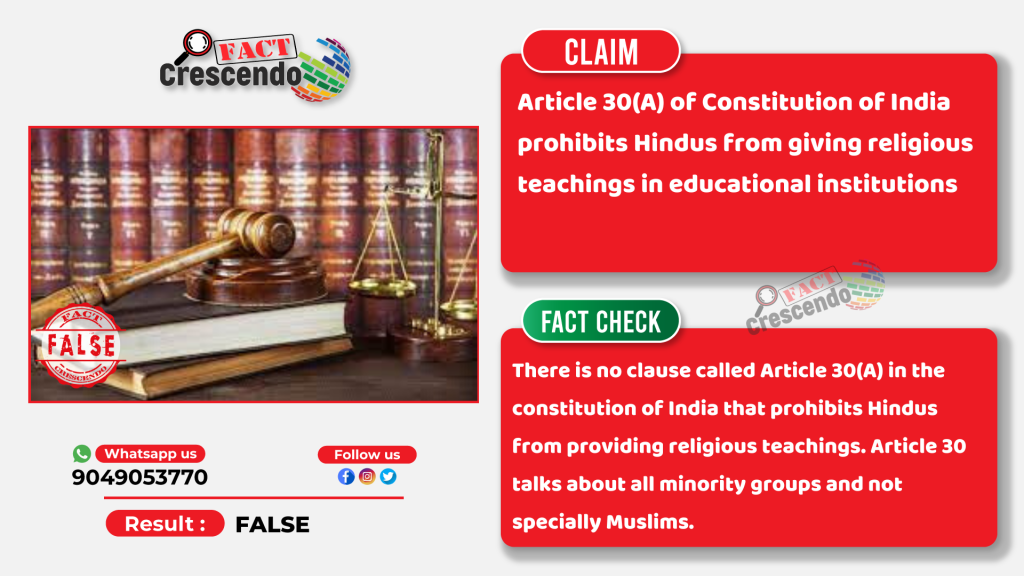
An old post on Article 30 and Article 30(A) of the Constitution of India has resurfaced again on social media. The post differentiates between the two clauses and proves how our constitution is biased in providing provisions for education of minorities and Hindus.
As per the claim, according to the Article 30(A) of the Constitution of India, Hindus are not allowed to give religious teachings in any educational institutions whereas under Article 30, minorities are allowed to run Madrassas.
However, Fact Crescendo found the claim to be false. There is no Article 30(A) in the Constitution of India.
Another post with a similar claim was also posted on Facebook in 2021. In the video, it was told that Article 30(A) is such a clause in our constitution which says that Hindus can’t give teachings in any educational institutions based on their religion nor can build their own religious institutions. But there is another clause 30 which permits Muslims and Christians to run their Madrassas and provide religious teachings.
Fact Check-
First, we tried to understand what is clause 30 and 30(A) in the Constitution of India. We found the Constitution of India on the government website. We found that in the Constitution there is Article 30(1), 30(1A) and 30(2). There was no mention of Article 30(A).
Article 30 Right of minorities to establish and administer educational institutions.— (1) All minorities, whether based on religion or language, shall have the right to establish and administer educational institutions of their choice
Article 30(1A) says In making any law providing for the compulsory acquisition of any property of an educational institution established and administered by a minority, referred to in clause (1), the State shall ensure that the amount fixed by or determined under such law for the acquisition of such property is such as would not restrict or abrogate the right guaranteed under that clause.


From the above facts it is clear that there is no clause called Article 30(A) in the Constitution of India. To get more insight on these clauses, we contacted Advocate Vikas Kumar from Delhi High Court. He told us, “According to Article 30, any linguistic or religious minorities can establish their own religious educational institutions. Muslims also come in the minority community but our constitution does not say anything about Muslims only. Minorities include Muslims, Christians, Jains, Parsis, etc. Language minorities like Lingayat, Urdu can open traditional educational institutions. But the Article 30(a) referred to in the claim does not exist in the Constitution. There is no section 30(a). 31(a) is there but 30(a) is not.”
Who are minorities in India?
According to the information provided on the Ministry of Education website, all minorities are given the right to establish and manage their own educational institutions under Article 30(1). The government has taken measures to improve education among religious or caste or backward caste people.
According to the 2001 census, Muslims, Christians, Sikhs, Buddhists and Persians are considered minorities.

Article 46 of the Constitution states that every state shall promote the educational or economic needs of SCs, STs and other weaker sections and protect them from social injustice and exploitation. Articles 330, 332, 335, 338 to 342 and the entire Fifth and Sixth Schedules of the Constitution ensure the implementation of the objectives set out in Article 46.
Similarly, Article 30(1) gives minorities the right to establish and maintain educational institutions of their choice.

Conclusion:
Fact Crescendo found the claim to be false. There is no clause called Article 30(A) in the constitution of India that prohibits Hindus from providing religious teachings in educational institutions. There is a clause 30 but that does not specifically say any special provisions for Muslims but those are for all religious and linguistic groups that come under minority category.

Title:Does Article 30(A) of Constitution of India prohibits Hindus from giving religious teachings in educational institutions? Know the truth.
Written By: Siddharth SahuResult: False


